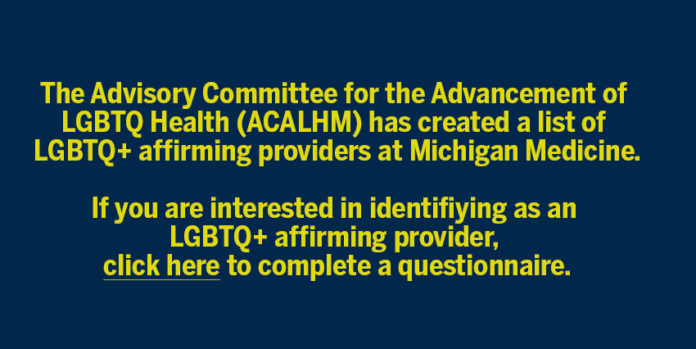When it comes to health equity, ensuring that individuals within the lesbian, gay, bisexual, transgender and queer/questioning — or LGBTQ+ — community receive adequate health care is essential. Unfortunately, health disparities, social stigma and discriminatory practices often negatively impact this community, making it difficult for them to receive necessary care.
At Michigan Medicine, various providers work to bring gender-affirming and other forms of equitable care to patients on a daily basis. In a recent conversation, three of these individuals, Geoffrey Barnes, M.D., a cardiologist and vascular medicine specialist, Katherine McConville, M.A., CCC-SLP, a speech-language pathologist and Amy Jacobs, LMSW, a social worker and mental health expert, shared their perspectives on these issues.
Gender-affirming and equitable LGBTQ+ health care at Michigan Medicine
How does your work positively impact the health (and wellness) of individuals within the LGBTQ+ community?

Barnes: As a cardiologist and vascular medicine specialist, I see patients with questions or concerns about the heart and/or blood vessels. My practice has a particular focus on caring for patients who have had blood clots or are taking blood thinners. This matches my research interest, which is focused on improving the care for patients who take blood thinning medications.
I have the privilege of caring for many transgender patients to help them navigate cardiovascular disease and medications. I tend to see transgender patients for one of two questions. First, many patients are concerned about their risk of developing blood clots while taking hormone therapy (especially estrogen hormones). Second, many patients have questions about their risk of heart attack or stroke either with hormone therapy or when undergoing surgery.
My approach to caring for transgender patients is to listen and understand what their priorities are for their health care. Then, I try to provide them information about risks and benefits of different treatments so that they can make the best choice for themselves. Whenever possible, I try to help patients find treatment options that allow them to affirm their gender identity.
McConville: The American Speech and Hearing Association defines a speech-language pathologist as “the professional who engages in professional practice in the areas of communication and swallowing across the life span.” That is incredibly broad when you think about it. Many people associate speech pathologists with specific areas of practice within this broad scope, like articulation problems in children or language deficits in adults after a stroke.

My specialized area of practice is in voice care. I work closely with our otolaryngology department to help people whose voices do not meet their needs for a variety of reasons, ranging from illness or injury to a voice that does not match their gender.
For many, a voice that does not match one’s gender can provoke feelings of dysphoria or interfere with daily life in other ways. For transgender women in particular, voice therapy is one of the most sought after gender-affirming services.
The specialized SLP team at Michigan Medicine is poised to use the most up-to-date knowledge to effectively help clients with voice-related concerns (both related and unrelated to gender) to produce a voice that best meets their needs while limiting the risk of strain or injury to the voice.
Sadly, barriers to care continue to exist. For voice care, inconsistent insurance coverage for therapy is a persistent problem. We continue to work behind the scenes to advocate for change in insurance policies that limit affordable access to these important services, but we also have a private pay program that allows those without coverage to obtain more affordable care.
We also offer care in two different physical locations (one in the Ann Arbor area and one in Brighton) as well as via telehealth to make coming to sessions more convenient.
Jacobs: I work for the HIV/AIDS Treatment Program at Michigan Medicine. We are a federal grant funded program that provides outpatient care to individuals living with HIV. My role with the program is to provide new patient assessments and mental health therapy to our patients, who are about 75% LGBTQ+.
Mental illness disproportionately impacts members of the LGBTQ+ community. If you add to that living with a chronic illness like HIV, as well as the social stigma that is still present surrounding HIV, then you can imagine how much depression and anxiety is present in our patient population.
Since the pandemic, my therapy case load has increased five-fold, and I now spend the majority of my time providing individual therapy to our patients. Even our patients who were coping well with their HIV or sexual orientation or gender identity before COVID-19 are struggling now.
I have been an outspoken supporter and advocate for LGBTQ+ rights since I was in high school. Through my current role, I work hard to provide a program that is not only inclusive and competent, but celebrates the lives and experiences of LGBTQ+ folks living with HIV, as well as their partners and family members. I provide extra support to people who are newly diagnosed with HIV, and who are also sometimes just starting their journey with coming out.
I think knowing that someone at Michigan Medicine has their best interest at heart and cares for them, not in spite of their sexual orientation and/or gender identity, but because of their sexual orientation and/or gender identity, can make a lasting impact on how individuals access health care.
As a part of several committees, councils and organizations whose purpose is to advance equity and inclusion for the LGBTQ+ community in health care, I have been able to participate in shaping policies, trainings and entire programs that steer providers towards better care for their LGBTQ+ patients and their LGBTQ+ staff.
Since the start of the COVID-19 pandemic, individuals have more widely accepted telehealth as a mode for receiving health care. How has this option benefited those within the LGBTQ+ community?
Barnes: I have seen a number of advantages for LGBTQ+ patients since the start of the COVID-19 pandemic. First, easier access to telehealth has allowed patients who do not live close to Michigan Medicine to still get their necessary care from their clinicians. This is especially helpful for patients who used to travel hours to see me in the clinic. Often, we can have that same visit over their phone or computer and save them hours of travel time.
Second, some LGBTQ+ patients are hesitant about visiting doctors’ offices because they are concerned with how many different people they will be in contact with and are unsure if they will be accepted and treated with respect.
At Michigan Medicine, we strive to treat every patient with the utmost respect that they deserve. Virtual care has helped some patients feel more comfortable scheduling visits with their clinician since they interact with far fewer people. They just hop on a video call with their clinician and do not need face-to-face interactions with many of the office staff and other patients and/or families.
Explain more about how your work is not exclusionary to one subset of this population.
McConville: I think it is vital to recognize that like individual people, gender is diverse and unique. In gender-related voice care, we risk falling into a very “binary” trap if we don’t remain open to individuality. In this context, voice care for the LGBTQ+ community is not limited to only helping transgender women sound as classically feminine as possible. This isn’t a goal for all transgender women that I meet, for example.
Really, anyone with concerns about voice expression may benefit from seeing a specialized speech pathologist at some point in time and the individual’s needs and wants are going to shape our goals. In the past, we assumed that transgender men, for example, wouldn’t want or need voice care. However, there is emerging research suggesting that a large subset of this population may have residual concerns about voice quality as it relates to gender even after hormone therapies have taken effect.
While we tend to be data-driven in health care, it’s always best to bring things back to the individual. Through discussions between speech pathologists and individuals in the LGBTQ+ community, many meaningful examples and stories of how someone may need their voice to function differently may arise.
Our work is always going to consider the evidence and theory we have about what is effective in adjusting a voice healthily, but we also consider this flexibly within the context of what an individual tells us about their needs and lived experience.
Jacobs: I am a member of the Advisory Committee for Advancement of LGBTQ+ Health at Michigan Medicine and sit on the Board of Directors of OutCare Health, a national non-profit organization that serves as a resource for LGBTQ+ health care providers.
Over the past 10 years, I have been lucky enough to also frequently present on topics related to HIV, LGBTQ+ mental health and health disparities, alternative relationships and several other topics at national, statewide and local conferences, local universities, for Michigan Medicine, and at other independent organizations.
LGBTQ+ support has been a part of my life for over 25 years, and will always be a part of my life. And this work truly reaches a broad spectrum of individuals.
Based on feedback from patients, the group has developed the Michigan Medicine LGBTQ+ affirming providers list.









